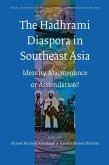This volume covers the long neglected history of Hadhramaut (southern Arabia) during the modern colonial era, together with the history of Hadhrami "colonies" in the Malay world, southern India, the Red Sea, and East Africa. After an introduction placing Hadhramis in the context of other diasporas, there are sections on local and international politics, social stratification and integration, religious and social reform, and economic dynamics. The conclusion brings the story to the present day and outlines a research agenda. Many aspects of Indian Ocean history are illuminated by this book, notably the role of non-Western merchants in the spread of capitalism, Islamisation and the controversies which raged within Islam, British and Ottoman strategic concerns, social antagonisms in southern Arabia, and the cosmopolitan character of coastal societies.








